As a dog parent, how often have you ever wondered, “Why is my dog’s nose dry?” Do I need to call the vet?” It can be hard to know what to make of your dry-nosed pup, but integrative veterinarian, Dr. Julie Buzby, is here to help. She describes how a dog’s nose stays wet, lists 11 reasons for a dry nose, and explains when a vet visit may be in order.
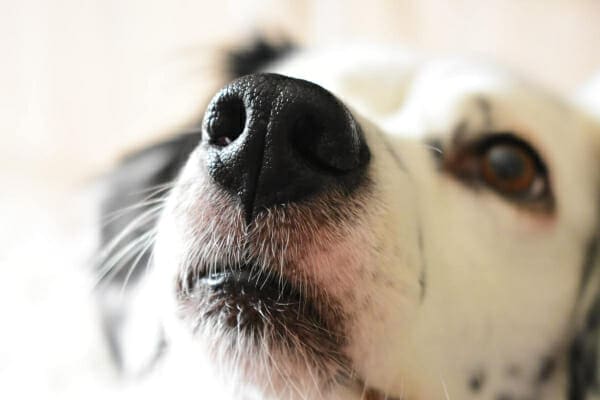
Did you know that part of your dog’s amazing ability to detect smell depends on your dog’s nose staying wet? That wet nose has a very important purpose. The moisture traps odors and helps give your dog his or her amazing sense of smell.
Dogs’ noses also help regulate their body temperature. Evaporation of moisture from the nose and paw pads can aid in cooling, similar to sweating.
So, is a dry-nose dog cause for concern? During my years as a veterinarian, I have talked to countless pet parents who were worried because they noticed their pup’s normally cold, wet nose was warm and dry. It is understandable that they would be concerned because most people have heard the old wives’ tale that says a warm, dry nose means a dog is sick.
Thankfully, although there are many reasons for a dry nose, the majority of them aren’t a problem. To understand why your dog’s nose may be dry, first let’s discover how your pup’s nose gets wet.
What keeps your dog’s nose cool and wet?
There are two ways your dog’s nose gets wet. First, special glands beneath the surface of your dog’s nose produce mucus. This mucus coats the surface of your dog’s nose, keeping it moist.
Second, you’ve probably noticed your dog licking his or her nose regularly, right? Dogs lick their nose to keep it wet and primed for amazing odor detection.
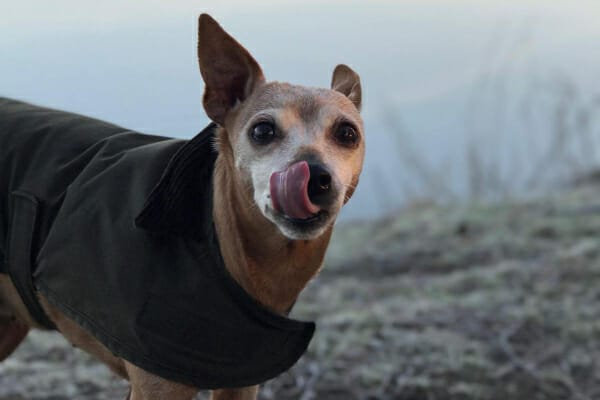
This is important for your dog’s sense of smell, and it’s why your furry family member is 10,000 to 100,000 times better at detecting odors than you are. Amazing, right? An intriguing article from the PBS science series NOVA describes more about dogs’ dazzling sense of smell.
Why is my dog’s nose dry?
Now that you understand how your dog’s nose normally stays wet, let’s talk about what it means when your dog’s nose is dry. Some of these 11 reasons for a dry nose are completely harmless while others are more worrisome.
1. Sleeping
This one is pretty simple. When your dog is fast asleep, he or she is too busy dreaming to be licking his or her nose. Dogs will often have a dry nose when they first wake up after sleeping, but it will soon become wet again once they resume their usual licking.
2. Dehydration
Hard exercise, not having a drink of water for a while, or illness can all cause your dog to become dehydrated. This can dry out the surface of the nose. It’s really important to make sure your dog has access to plenty of fresh water during vigorous exercise so that he or she doesn’t experience dehydration. Dehydration after exercise typically resolves quickly on its own after a drink of water.
If your dog’s dry nose persists beyond a few days or if your dog is showing other signs of illness, it’s best to have your vet check him or her out.
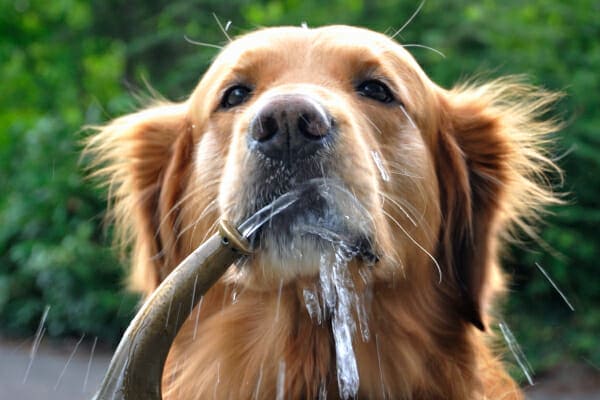
3. Dry eye or blocked tear ducts
Believe it or not, a dry nose may be a sign of dry eye in dogs. The nasolacrimal ducts connect the tear ducts to the nasal canal, so blocked tear ducts or decreased tear production can affect the nose as well.
Unilateral, or one-sided dryness, may be a sign of neurogenic KCS (keratoconjunctivitis sicca, another name for dry eye). The same nerves that control the tear duct help keep the nose moist, so if there is nerve damage due to trauma, infection, or another reason, the eye and nose may be dry on one side.
Generally speaking, dry nose due to dry eye does not resolve with hydration or licking the nose. If you’re concerned your dog may have dry eye, make an appointment with your vet to talk about diagnostic and treatment options.
4. Breed
Dogs with short snouts are referred to as brachycephalic (which literally means “short-headed”). This includes dog breeds like Pugs, Bulldogs, and Boxers. Because of their smushed face conformation, these dogs usually have trouble getting their tongue to reach their noses. Since they may not be able to lick their noses effectively, this means they will have a drier nose than their longer-nosed counterparts do.
On a related note, many brachycephalic breeds are prone to dry eye, so a dry nose may be multifactorial in these dogs.
5. High body temperature or fever
Increased body heat can dry out your dog’s nose. This may happen if it’s really warm outside. (By the way, hot weather also can put your dog at risk for heatstroke in dogs).
Alternatively, sometimes a dog who has a fever will have a dry nose. This may be where the old wives’ tale about a dry nose being a sign of illness in dogs originated.
Typically, if fever is the culprit, your dog will show other symptoms as well. These may include signs of a lethargic dog or having a decreased appetite. These signs of illness warrant a trip to see your vet.
If you’re worried your dog may have a fever and want to check his or her temperature at home, I recommend an ear thermometer. Obviously we can’t convince our puppy dog pals to hold a thermometer under their tongues. The most accurate result is obtained by taking a rectal temperature, but I generally suggest dog owners leave that to the professionals.
Most dogs don’t appreciate having their temperature taken in this way, and it is possible to inadvertently cause pain or injury to the dog’s rectum when taking a temperature. An ear thermometer gives us a good general idea of whether a dog’s temperature is normal or increased.
Speaking of normal temperatures, don’t forget that dogs’ resting body temperature is higher than humans’. Normal dog body temperature is around 99-102.5oF. So don’t worry if your dog’s temperature is not the same as yours!
6. Sunburn
A dog’s nose is one of the most susceptible places to sunburn, particularly if your canine companion happens to have a pink or pale nose. A sunburn can cause your dog’s snout to become red, sore, cracked, or dry. Luckily, there are many dog-friendly sunscreens you can use on your dog’s nose to keep him or her safe on a sunny day.
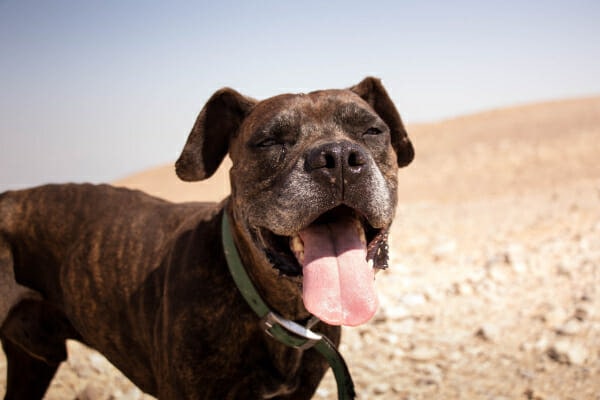
7. Allergies
Although it’s not the most common symptom of allergies in dogs (allergic dogs more commonly have itchy skin, hair loss, or other symptoms), a dry nose can be a sign of allergies. Talk to your vet about trying Benadryl for dogs to see if it helps your dog’s dry nose, or whether a different treatment option is more appropriate.
8. Nasal hyperkeratosis
This is the term for when the surface of the nose is dry and cracked or crusty. It can happen for several different reasons. For example, nasal hyperkeratosis in dogs is common in many breeds (like Cocker Spaniels) as well as senior dogs of all breeds. However, it is always best to check with your vet to rule out illness before assuming your dog’s dry nose is just breed or age-related hyperkeratosis.
9. Autoimmune diseases
Several autoimmune diseases can cause changes to your dog’s nose. In these diseases, the immune system goes a little haywire and attacks the cells in specific areas like the surface of your dog’s nose.
Two of the more common autoimmune skin conditions that affect the nose are discoid lupus erythematosus and pemphigus. In these conditions, the surface of your dog’s nose may start to bleed or ulcerate. Sometimes the nose will be dry and cracked or dry and peeling, and your dog’s nose may change color or lose its normal bumpy appearance.
These are sure indications that you should contact your veterinarian. Your vet may recommend a biopsy of the nose to get a sure diagnosis.
10. Low humidity and dry weather
It’s not only on hot summer days that your dog may have a dry nose. Low humidity can quickly dry out his or her nose, just like we get chapped lips or dry hands during cold dry weather. Sometimes dogs may seek out sources of warmth, such as heaters, which can further dry out their noses. Fortunately, this type of dry nose in dogs generally resolves on its own.
11. Age
As dogs get older, they tend to produce less of the mucus that helps keep their nose moist. For this reason, drier noses in dogs are common as they age. Although we know a dry nose is not in itself a sign of illness, older dogs are more prone to health problems, so it’s a good idea to have your senior dog checked by your veterinarian if you notice any changes to their body or behavior.
What does it mean if my dog’s nose is dry?
It’s best to look at what is going on with your dog as a whole when you are trying to interpret the significance of a dry nose. As you can see from the list above, there are a number of reasons that a dog might have a dry snout. Some of them are harmless and go away on their own. However, others do require a trip to the vet.
Signs you should take your dog to the vet
Generally, any time something has changed for your four-legged friend, you should consider getting him or her checked out by your vet. Here are some signs that definitely warrant a vet visit:
- Severe dehydration or sunken eyes
- Crusting, bleeding, or peeling of your dog’s nose
- Nasal discharge
- Excessive sneezing or reverse sneezing in dogs
- Change in the color of your dog’s nose that is not typical for him or her (i.e. not the normal seasonal variation in nose color seen in some dog breeds)
- Loss of normal “cobblestone” appearance of the nose (i.e. loss of the tiny bumps)
- Dryness of one side of a dog’s nose
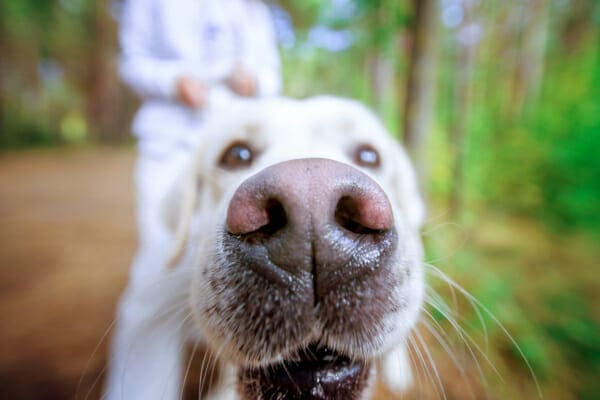
What can be done about a dog’s dry nose?
In most cases, no treatment is needed when you notice your dog’s nose is a little dry but don’t see any of the other signs (listed above) that warrant a vet visit. Perhaps your dog may have just woken up or gotten a little dehydrated after heavy exercise. Offer him or her some water and see if that helps.
However, if your dog’s nose is sore and crusty or you notice the signs listed above, it’s best to visit your vet to rule out anything more serious. He or she will carefully examine your dog’s nose and the rest of your dog as well.
In some cases your vet may want to biopsy your dog’s nose. He or she will do this by collecting a small tissue sample (typically requiring general anesthesia) from your dog’s nose and sending it to a veterinary pathologist for evaluation under the microscope.
Biopsies are especially helpful for diagnosing autoimmune diseases because the cells will have a distinctive appearance. Although anesthesia and a biopsy procedure may seem extreme, having a definitive diagnosis is important because treating autoimmune diseases often involves immunosuppressive medications.
If your vet suspects your dog has hyperkeratosis or a breed-related dry nose, you’ll be happy to hear that this is often just a cosmetic issue. However, because it can lead to fissures and bleeding, keep a good eye on it and seek veterinary advice if it leads to discomfort.
What can you put on a dog’s dry nose?
Applying a balm to increase hydration can be helpful. Commercially available pet products such as Snout Soother® and Dermoscent BIO BALM® help alleviate dry nose in dogs.
Some human OTC balms such as Aquaphor can be helpful, but be sure to apply only a small amount and rub it into the nose well to prevent your dog from licking it off. Ensure you do not accidentally obstruct your dog’s nostrils when you apply any of these nose balms.
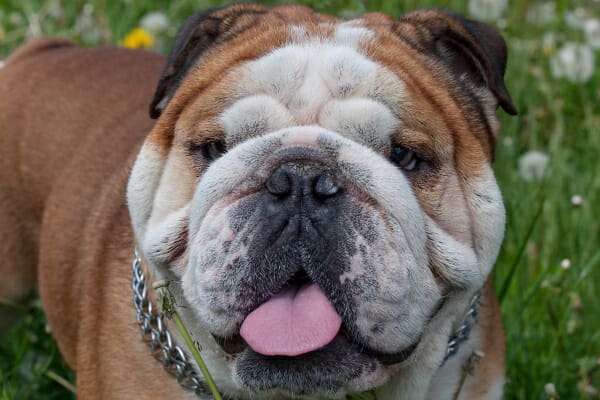
Good news for the dry nose dilemma
The next time you are wondering why your dog’s nose is dry, think through the causes we talked about. Was your dog sleeping or hot? Is it dry in your house? Or are you seeing other concerning signs like a cracking, bleeding, or sore nose? Is your dog acting normal or is he or she showing other possible signs of disease? These questions will help you decide if you should call your vet or offer your dog some water, give it some time, and see what happens.
When in doubt though, it is always best to check in with your vet. Although most causes of a dry nose in dogs are easily remedied, some are more serious.
A dog’s nose gives him or her an amazing sense of smell. With the help of your veterinarian, you can keep your beloved dog’s nose looking good and working well for years to come.

Has your dog ever had problems with a dry nose?
Please share any helpful hints you have for other dog parents who are in a similar position.


My senior dog has a very crusty dry nose . I just started using snout soother. Will those dry skins on the nose flake off or will it just soften up a bit. He’s 17
Hi Debbie,
I am glad you are trying Snout Soother and hopeful you will start to see results soon. This product does not make the crusts fall off but rather softens them and restores the health of the new skin that is growing underneath. Dog’s skin cells are constantly shedding and being replaced (just like people). So, you may notice the crusts flaking off as the new layers are forming underneath just as a scab will eventually dry up and fall off as new healthy tissue forms under it. If you have lingering concerns about your dog’s dry nose, don’t hesitate to reach out to your vet. It is always a good idea to rule out medical issues that could be contributing to the situation. Best wishes and good luck!
My Samoyed seems to have dried snot on his very dry nose coming out of the nostrils. I just noticed these “snot scabs” and have been pulling them off every other day. They are dark greenish. Are you familiar with these scabs of dried mucus? The nose skin underneath is pink while most of the nose is black.
Hi Carla,
I understand your concern for your Samoyed with this chronic nasal discharge. I have seen this many times but there are just too many possible causes to make a diagnosis without some testing. Since I cannot examine your pup myself, I can’t offer specific conclusions or recommendations. Your best course of action would be to schedule an appointment with your vet to have your boy evaluated. Hoping for clear answers and an easy treatment. Best wishes to you both.
My 12 year old Dachshund recently has dry nose. She doesn’t appear to be ill she eats good and drinks water. Should I be concerned.?
Hi Nalana,
I understand your concern with this sudden change in your Dachshund’s nose. Unfortunately, without examining her myself, I can’t make specific conclusions about her health. Your best course of action is to have your vet take a look at your pup. They can let you know if something needs to be done or if this is just normal changes due to her age. Hoping you can get some answers and praying all is well.
hi my dog has a real dry.nose and is going off her food can U help me
Hi Anne,
I wish I could offer advice about this situation with your pup. Unfortunately, without examining her myself, I can’t make specific conclusions or recommendations. She would need to be evaluated by your vet in order to make a diagnosis. Best wishes to you and your girl.
Hello , my 2 year old golden lab has a dry nose out of nowhere , is this something i should be worried about
Hi N,
I understand your concern for your young dog. As the article states, there are some conditions that cause a dry nose that would be cause for worry and others that are not necessarily a problem. The only way to know if your dog’s dry nose needs attention is to have it evaluated by your vet. Best wishes!
I have had my dog for 2.5 months (she’s a rescue, almost 2 years old) and she rarely has a wet nose. It’s not crusty or cracked; it just isn’t wet. Should I be concerned? Hey activity/ energy level hasn’t changed, but she is more defensive/ anxious now than when I got her.
Hi Bobbi,
I don’t think there is a reason to be worried about your dog’s dry nose. But just to be sure, it would be a good idea to have her evaluated by your vet. They can do some routine wellness lab work to make sure no issues are noted. Also, this would be the perfect time to discuss your dog’s anxiety and defensive behaviors.
My dog is currently taking Gabapentin, could his medication be causing his dry nose?
Hi Sue,
I am not aware of any information about Gabapentin causing dry nose in dogs, but I guess it could be possible. If you have concerns about your dog’s medication, I recommend you talk to your vet and let them answer any questions you may have. I will attach links to other articles that might have additional information. Best wishes.
1. What is Gabapentin for Dogs?
2. Gabapentin Side Effects in Dogs Are Nothing to Fear
My 9 year old black lab has an extremely dry nose, that is because almost clogged with what looks like darkened nasal seepage that dries very quickly or it’s just really crusty. It’s becoming hard for him to even breathe through it, and it’s been like this for a couple weeks now. We used snout soother and that helped a little at first and then rapidly got worse.
Hi Ashley,
I am sorry your Lab is having these issues with his nose. I highly recommend you have your vet take a look at it and do a thorough exam. From what you describe, I would want to rule out the possibility of nasal bleeding or an infection. Hoping you can get some answers and ensure your sweet boy remains happy and healthy for many years to come.
It is very interesting you ask this question. I have been treating my Akita with Gabapentin for pain as needed and he would get a little bit of dry nose while he was on it and I questioned if the Gabapentin was causing it. Recently he did something that was causing his tail to stay down so he was on a large dose for several weeks and now his nose is a mess and it is not getting better even though he has been off it for a month. Now he might need a biopsy to determine if it is an autoimmune disease like lupus, pemphigus etc…
Hi Kristine,
This topic about Gabapentin and dry nose really has my interest. Thank you for sharing your experience as it may help other readers. Praying for good results and a favorable diagnosis for your boy!
My English Cocker Spaniel had a dry crusty nose. I got some Snout Soother and that helped with the crusty part but her nose is still dry. But from what I read in this article, the Cocker Spaniel breed tends to have dry noses. Our vet was not concerned and said he had used Snout Soother on his dog too.
Hi Susan,
Yes, Cocker Spaniels are notorious for having dry noses! I am glad the Snout Soother is helping with the crusts. Thank you for sharing your experience with us.